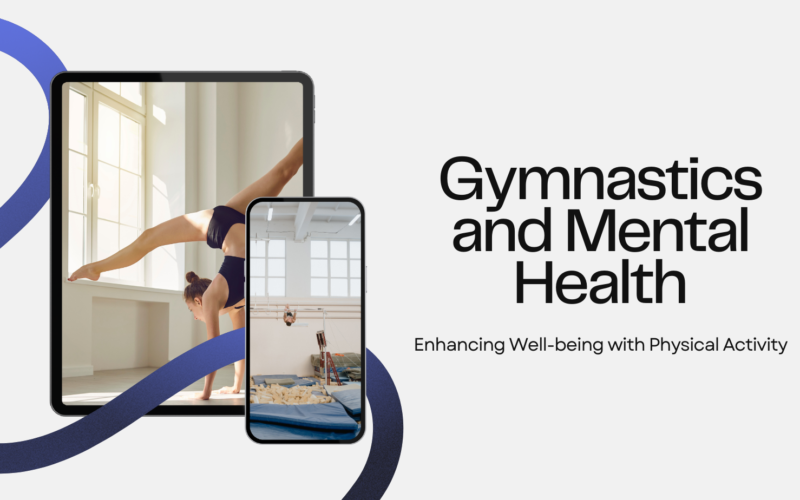Introduction
Gymnastics, with its breathtaking flips, twists, and routines performed with precision, showcases the pinnacle of physical prowess and athleticism.
However, beneath the surface of this demanding sport lies a crucial yet often overlooked component: mental health.
The connection between gymnastics and mental well-being is intricate and profound, impacting not only performance but also the overall health and happiness of gymnasts.
In this article, we delve into the significance of mental health in gymnastics and explore strategies to enhance well-being within the sport.
Gymnastics demands not only physical strength and agility but also mental fortitude. The pressure to perform flawlessly in competitions, the rigorous training regimens, and the constant pursuit of perfection can take a toll on gymnasts’ mental health.
Recognizing the importance of mental well-being is essential not only for optimizing performance but also for nurturing the holistic development of gymnasts.
Signs of Mental Health Challenges in Gymnasts
Signs of mental health challenges in gymnasts may manifest in various ways, including behavioral changes such as withdrawal from social interactions, emotional shutdown, and increased stress or anxiety.
Perfectionism, a common trait among gymnasts striving for excellence, can exacerbate these challenges.
It is crucial for coaches, parents, and teammates to be vigilant and proactive in identifying these signs early to provide appropriate support and intervention.
Supporting Gymnasts’ Mental Health
Creating a supportive environment is paramount in fostering the mental well-being of gymnasts.
Coaches and parents play a pivotal role in this regard, serving as mentors and advocates for their athletes.
Open communication channels, where gymnasts feel comfortable expressing their thoughts and emotions without fear of judgment, are essential.
Moreover, coaches and parents can model healthy mental health behaviors, demonstrating the importance of self-care, resilience, and seeking support when needed.
Impact of Mental Health on Performance
The link between mental health and performance in gymnastics is undeniable. A positive mindset, confidence, and resilience are critical components of success in the sport.
Mental health challenges can hinder performance by undermining confidence, increasing stress levels, and impeding the ability to cope with pressure effectively.
Developing mental skills such as visualization, goal-setting, and mindfulness can help gymnasts overcome these challenges and perform at their best when it matters most.
Promoting Mental Well-Being in Gymnastics Programs
Gymnastics programs must prioritize mental health alongside physical training. This involves providing resources for mental skills training, integrating mental health education into training curricula, and fostering a supportive team environment where gymnasts feel valued and supported.
Coaches can incorporate mindfulness exercises, relaxation techniques, and team-building activities to enhance mental well-being and cohesion within the team.
Strategies for Maintaining Good Mental Health
Maintaining good mental health requires a proactive approach from gymnasts themselves. Practicing self-care, such as getting adequate rest, nutrition, and relaxation, is essential for managing stress and preventing burnout.
Additionally, seeking support from coaches, peers, or mental health professionals when needed can provide valuable guidance and perspective.
Balancing the demands of training with personal life is crucial for overall well-being and long-term sustainability in the sport.
The Role of Leadership and Organizational Support
Leadership within gymnastics organizations, whether at the club, regional, or national level, also plays a crucial role in promoting mental health.
By implementing policies and initiatives that prioritize athlete well-being, such as providing access to mental health resources and training for coaches and staff, organizations can create a culture that values and supports the mental health of gymnasts.
Additionally, fostering collaboration with mental health professionals and advocacy groups can further enhance the support available to athletes.
Addressing Stigma and Seeking Help
Despite growing awareness of mental health issues in sports, stigma can still prevent gymnasts from seeking help when needed.
Education and awareness campaigns aimed at destigmatizing mental health challenges can empower athletes to seek support without fear of judgment or discrimination.
Coaches, parents, and peers can also play a role in normalizing discussions about mental health and encouraging help-seeking behaviors.
Long-Term Impact and Life Skills
The benefits of prioritizing mental health in gymnastics extend beyond the sport itself. By equipping gymnasts with coping strategies, resilience, and emotional intelligence, the sport can impart valuable life skills that are applicable in various aspects of their lives.
Whether pursuing further education, transitioning to a career outside of gymnastics, or facing personal challenges, the mental fortitude developed through gymnastics can serve athletes well throughout their lives.
Diversity, Inclusion, and Mental Health
It is essential to acknowledge that the experiences of gymnasts regarding mental health may vary based on factors such as gender, race, ethnicity, socioeconomic status, and LGBTQ+ identity.
Creating inclusive and equitable environments where all gymnasts feel valued and supported is critical for promoting mental health and well-being across diverse populations.
Conclusion
In conclusion, the intersection of gymnastics and mental health underscores the importance of nurturing the holistic well-being of athletes.
By recognizing and addressing mental health challenges early, fostering a supportive environment, and equipping gymnasts with the necessary mental skills, we can enhance performance and promote the overall health and happiness of gymnasts.
Ultimately, prioritizing mental health in gymnastics is not only beneficial for individual athletes but also for the sport as a whole, ensuring its sustainability and continued growth in the years to come.
FAQs
1. Why is mental health important in gymnastics?
Mental health is crucial in gymnastics as it impacts performance, safety, and overall well-being.
2. What are some signs that a gymnast’s mental health may be at risk?
Signs that a gymnast’s mental health may be at risk include behavior changes like withdrawal from teammates, emotional shutdown, increased stress, anxiety, or perfectionism. It’s essential for coaches, parents, and athletes to recognize these signs and seek appropriate support[2][5].
3. How can coaches and parents support gymnasts’ mental health?
Coaches and parents can support gymnasts’ mental health by fostering open communication, creating touch points for connection, modeling healthy mental health behaviors, and being attentive to signs of distress or burnout.
4. What role does mental health play in gymnasts’ performance and success?
Mental health significantly influences gymnasts’ performance, confidence, and resilience. Strong mental well-being helps athletes cope with stress, manage competition pressure, and maintain a positive mindset essential for success in gymnastics.
5. What are some strategies for gymnasts to maintain good mental health?
Gymnasts can maintain good mental health by practicing self-care, seeking support when needed, setting realistic goals, managing stress effectively, and prioritizing balance between training, academics, and personal life.






